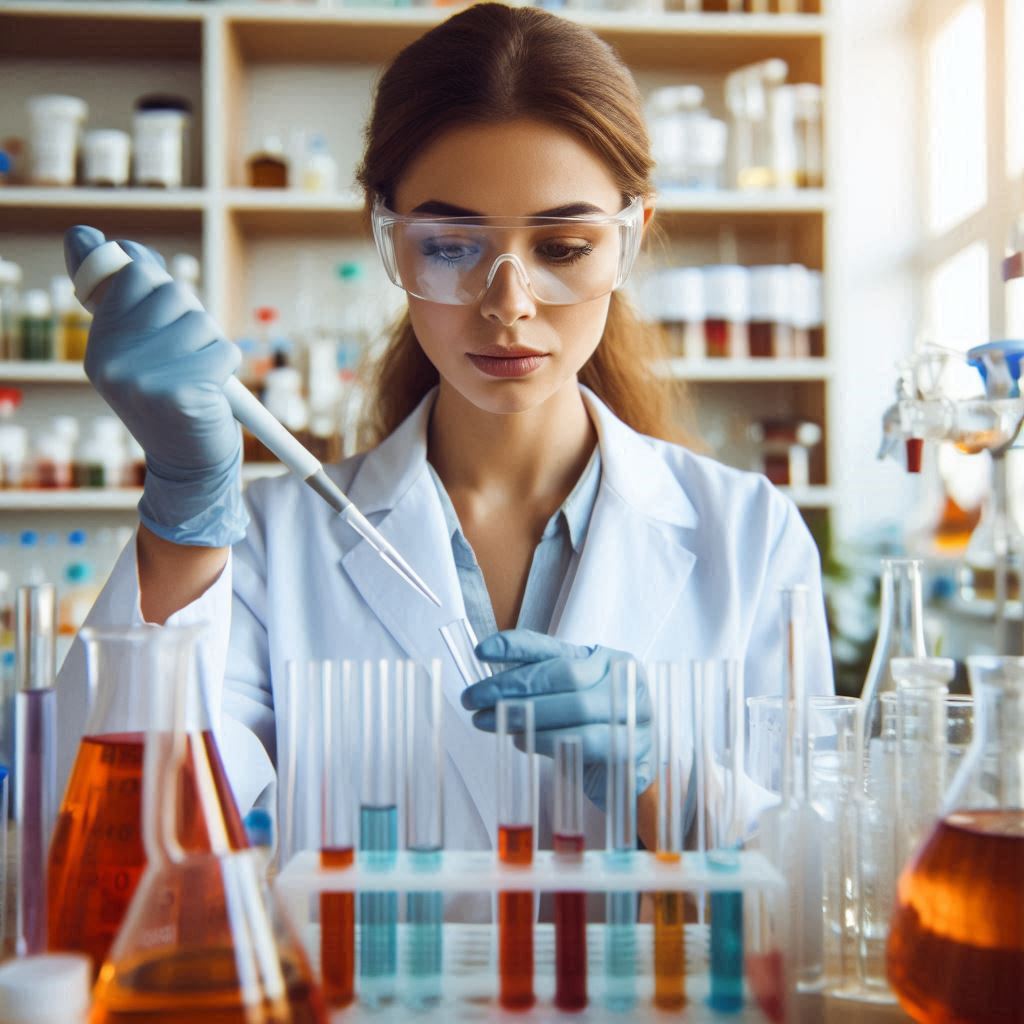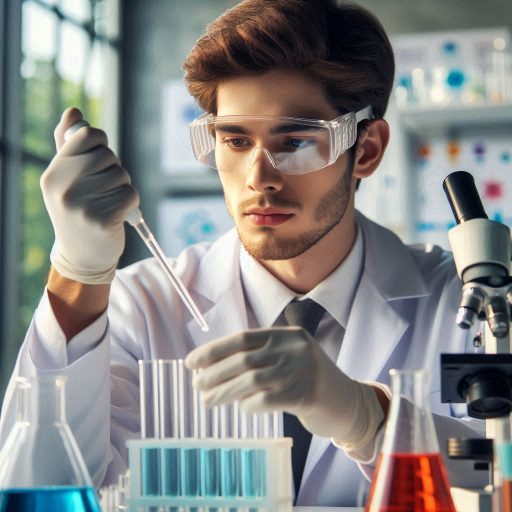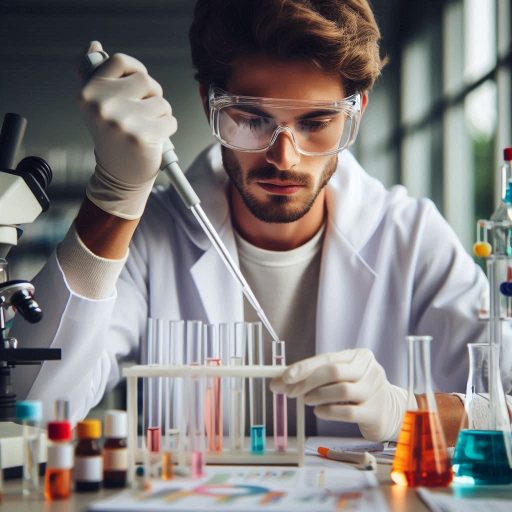Introduction
The Role of a Laboratory Technician
Laboratory technicians are essential in scientific and medical settings.
They conduct tests, analyze samples, and ensure data accuracy, which supports research and diagnostic processes.
Their work is foundational to advancing science and healthcare.
The Importance of Having Specific Skills in This Field
Having specific skills is crucial for laboratory technicians.
These skills ensure that technicians can perform their tasks with precision and efficiency.
Mastery of essential competencies leads to reliable results and contributes significantly to the success of research and diagnostic efforts.
Without these skills, the accuracy and reliability of laboratory work could be compromised.
The Top Skills That Aspiring Laboratory Technicians Should Possess
Aspiring laboratory technicians need to develop several key skills.
Attention to detail is crucial for precise results, while proficiency with lab equipment ensures reliable data collection.
Strong analytical skills are necessary for interpreting complex information accurately.
Effective communication aids in collaboration and accurate reporting.
Problem-solving abilities help address and resolve technical issues.
Mastering these skills will enhance job performance and open doors to rewarding career opportunities in various fields.
Attention to Detail
How Being Detail-Oriented Is Crucial in a Laboratory Setting
Attention to detail is a cornerstone of success for laboratory technicians.
This skill ensures precision in all aspects of laboratory work.
Inaccurate measurements or overlooked details can lead to flawed results and wasted resources.
Being meticulous helps avoid such costly errors and ensures reliable outcomes.
Precision in tasks like sample preparation, reagent mixing, and data recording is essential to maintain the integrity of experimental results.
Examples of How Attention to Detail Can Prevent Errors in Experiments
In a laboratory setting, small mistakes can have significant repercussions.
For example, an incorrect chemical concentration could skew experimental results.
Similarly, mislabeling samples might lead to cross-contamination and compromised data integrity.
By carefully following protocols and double-checking measurements, technicians can prevent these errors.
Accurate documentation also helps track experimental conditions and outcomes, ensuring consistency and reliability in results.
Ways for Aspiring Technicians to Improve Their Attention to Detail
Aspiring technicians can enhance their attention to detail through several practices.
Developing a checklist for each procedure can help ensure that no step is overlooked.
Additionally, practicing mindfulness can improve focus and reduce the likelihood of errors.
Regularly reviewing protocols and procedures reinforces accuracy and consistency.
Another effective strategy is to keep a detailed lab notebook.
Documenting each step of the process helps track progress and identify any deviations.
This practice not only aids in maintaining precision but also provides a reference for troubleshooting any issues that arise.
Engaging in hands-on practice is also beneficial.
By repetitively performing tasks, technicians become more familiar with procedures and develop a sharper eye for detail.
Seeking feedback from experienced colleagues can provide valuable insights into improving precision and accuracy.
Finally, maintaining an organized workspace contributes to attention to detail.
A clutter-free environment reduces distractions and allows technicians to focus on their tasks.
Properly labeling and storing equipment and samples prevents confusion and ensures that everything is in its correct place.
In summary, attention to detail is crucial for laboratory technicians to ensure accuracy and reliability in their work.
By adopting practices such as checklists, mindfulness, detailed documentation, and maintaining an organized workspace, aspiring technicians can significantly enhance their attention to detail.
This skill not only prevents errors but also contributes to the overall success and credibility of laboratory research.
Read: Importance of Accuracy in Surveying and Mapping
Strong Communication Skills
The Importance of Effective Communication with Colleagues and Supervisors
Effective communication is essential for laboratory technicians.
It facilitates collaboration and ensures that all team members are on the same page.
Clear communication with colleagues and supervisors prevents misunderstandings and promotes a harmonious work environment.
It helps in coordinating tasks, discussing experimental methods, and addressing any issues that arise.
Good communication skills enable technicians to convey important information, ask for guidance, and contribute to team discussions, enhancing overall productivity and efficiency.
The Need for Clear and Concise Reporting of Findings
Clear and concise reporting of findings is critical in a laboratory setting.
Accurate documentation of results ensures that experiments can be replicated and verified by others.
Miscommunication or vague reports can lead to misinterpretation of data and hinder further research.
Effective reporting involves presenting data in a structured format, using precise language, and including all relevant details.
This clarity helps in drawing accurate conclusions and facilitates the peer review process, contributing to the credibility and reliability of scientific research.
Tips on How to Enhance Communication Skills Through Practice and Feedback
To enhance communication skills, aspiring technicians should practice regularly.
Engaging in group discussions and presentations can build confidence and improve clarity.
Actively listening to feedback from colleagues and supervisors helps in refining communication techniques.
Seeking constructive criticism allows technicians to identify areas for improvement and adjust their approach accordingly.
Additionally, participating in workshops or training sessions focused on communication can provide valuable skills and strategies.
Practicing clear and concise writing is also crucial.
Keeping reports straightforward and well-organized ensures that information is easily understood.
Regularly reviewing and revising written work helps in honing these skills.
Furthermore, observing and learning from experienced colleagues can offer insights into effective communication practices.
In summary, strong communication skills are vital for laboratory technicians to collaborate effectively, report findings accurately, and contribute to the success of research projects.
By practicing regularly, seeking feedback, and engaging in relevant training, technicians can enhance their communication abilities and improve their overall performance in the laboratory.
Read: Surveying and Mapping Technician: Job Satisfaction
Technical Proficiency
The Essential Technical Skills Required for Laboratory Technicians
Laboratory technicians must possess a range of essential technical skills.
These include proficiency in operating laboratory instruments and equipment, such as spectrophotometers, centrifuges, and chromatographs.
Skills in sample preparation and analysis are crucial, including the ability to handle and process biological and chemical samples accurately.
Technicians should also be adept at performing assays and experiments, as well as understanding and applying various analytical techniques.
Additionally, knowledge of safety protocols and proper waste disposal is vital to ensure a safe working environment.
Relevant Courses or Certifications to Improve Technical Proficiency
Aspiring laboratory technicians can enhance their technical proficiency through various courses and certifications.
Enrolling in courses on laboratory techniques and instrumentation can provide hands-on experience with essential equipment.
Certifications such as the Clinical Laboratory Technician (CLT) or Certified Laboratory Technician (CLT) credentials offer formal recognition of technical skills and knowledge.
Specialized courses in areas like molecular biology, biochemistry, or analytical chemistry can deepen expertise in specific fields.
Online platforms like Coursera or edX also offer relevant courses that can supplement formal education.
The Importance of Staying Up-to-Date with Technological Advancements in the Field
Staying up-to-date with technological advancements is crucial for laboratory technicians.
The field of laboratory science is continually evolving with new technologies and methods.
Keeping abreast of these changes ensures that technicians can utilize the latest tools and techniques, improving accuracy and efficiency.
Regularly attending workshops, conferences, and industry seminars can provide insights into emerging trends and innovations.
Additionally, subscribing to scientific journals and professional organizations helps technicians stay informed about advancements and best practices.
Embracing new technologies enhances a technician’s ability to contribute to cutting-edge research and maintain a competitive edge in the field.
In summary, technical proficiency is essential for laboratory technicians, involving a range of skills and knowledge.
By pursuing relevant courses and certifications, and staying informed about technological advancements, technicians can enhance their expertise and contribute effectively to their field.
Read: Online Courses for Surveying and Mapping Technicians

Analytical Thinking
The Role of Analytical Thinking in Problem-Solving and Data Interpretation
Analytical thinking is crucial for laboratory technicians as it underpins problem-solving and data interpretation.
This skill involves breaking down complex problems into manageable parts, evaluating data systematically, and drawing logical conclusions.
Analytical thinking helps technicians identify patterns, detect anomalies, and understand the underlying causes of issues.
In data interpretation, it ensures that results are assessed accurately, and hypotheses are tested effectively.
Strong analytical skills lead to more reliable conclusions and better decision-making, which is essential for successful experimental outcomes and troubleshooting.
Examples of Situations Where Strong Analytical Skills Are Needed
Strong analytical skills are needed in various laboratory situations.
For instance, when analyzing experimental data, technicians must interpret complex datasets and identify trends or inconsistencies.
During troubleshooting, analytical thinking helps diagnose the source of equipment malfunctions or experimental failures.
In quality control, technicians use analytical skills to ensure that products meet specifications and identify any deviations from standards.
Additionally, when developing new procedures or optimizing existing ones, analytical thinking helps evaluate the effectiveness and efficiency of changes.
Strategies for Developing and Honing Analytical Thinking Abilities
To develop and hone analytical thinking abilities, technicians can employ several strategies.
Engaging in regular problem-solving exercises, such as case studies or brainteasers, can sharpen analytical skills.
Participating in cross-disciplinary projects exposes technicians to different perspectives and problem-solving approaches.
Additionally, practicing data analysis through software tools and statistical methods enhances the ability to interpret complex information.
Seeking feedback from peers and mentors provides valuable insights into improving analytical processes.
Further, dedicating time to review and reflect on past experiments helps technicians learn from their experiences and refine their analytical approaches.
Keeping up with scientific literature and staying informed about new methodologies can also contribute to developing a stronger analytical mindset.
In summary, analytical thinking is vital for laboratory technicians to solve problems and interpret data accurately.
By applying strategies such as problem-solving exercises, cross-disciplinary work, and ongoing education, technicians can enhance their analytical skills and improve their overall effectiveness in the laboratory.
Read: CAD Technician Salary: What to Expect in the USA
Time Management
The Fast-Paced Nature of Work in a Laboratory Environment
Work in a laboratory environment is often fast-paced and dynamic.
Technicians frequently juggle multiple tasks, such as running experiments, preparing samples, and analyzing data, all while maintaining strict accuracy and safety standards.
The need to respond quickly to unexpected results or equipment malfunctions adds to the urgency.
Additionally, meeting project deadlines and coordinating with team members can create a high-pressure environment.
Effective time management is crucial to navigate this pace successfully and ensure that all tasks are completed efficiently and accurately.
Transform Your Career Today
Unlock a personalized career strategy that drives real results. Get tailored advice and a roadmap designed just for you.
Start NowTools and Techniques for Effective Time Management
Several tools and techniques can enhance time management in a laboratory setting.
Using project management software, such as Asana or Trello, helps track tasks, deadlines, and progress.
Creating a daily or weekly schedule with clear priorities can aid in managing workload and ensuring that all responsibilities are addressed.
Utilizing time-tracking tools like Toggl can provide insights into how time is spent and identify areas for improvement.
Setting reminders and alarms for critical tasks and deadlines helps maintain focus and prevent delays.
Additionally, employing techniques such as the Pomodoro Technique‘working in focused intervals with short breaks‘can improve productivity and reduce burnout.
Keeping a well-organized workspace and minimizing distractions also contributes to better time management and efficiency.
The Importance of Prioritizing Tasks and Meeting Deadlines
Prioritizing tasks and meeting deadlines is essential in a laboratory environment.
Effective prioritization ensures that critical tasks are completed first, minimizing the risk of delays and errors.
It involves assessing the urgency and importance of each task and allocating time accordingly.
Meeting deadlines is crucial for maintaining project timelines and ensuring that results are available when needed for further analysis or reporting.
Failure to manage time effectively can lead to rushed work, compromised data quality, and potential setbacks in research progress.
In summary, effective time management is vital in the fast-paced laboratory environment.
By utilizing tools and techniques for scheduling, tracking, and prioritizing tasks, technicians can navigate their responsibilities efficiently.
Emphasizing the importance of meeting deadlines and maintaining a structured approach ensures that all tasks are completed accurately and on time, contributing to the overall success of laboratory operations.
Teamwork and Collaboration
The Significance of Teamwork in Achieving Research Goals
Teamwork is crucial for achieving research goals in a laboratory setting.
Collaborative efforts combine diverse skills and perspectives, leading to more comprehensive and innovative solutions.
Working as a team enhances problem-solving capabilities and allows for sharing the workload, which can increase efficiency and productivity.
Effective teamwork also fosters a supportive environment, where members can rely on each other‘s expertise to overcome challenges and achieve common objectives.
By collaborating, teams can address complex problems more effectively and accelerate progress toward research milestones.
Tips on How to Cultivate Collaborative Relationships with Colleagues
Cultivating collaborative relationships involves several key practices.
First, actively communicate with colleagues to build trust and understanding.
Regularly sharing updates and discussing progress helps ensure alignment on goals and expectations.
Being open to feedback and showing appreciation for others‘ contributions fosters a positive working environment.
Additionally, participating in team-building activities can strengthen relationships and improve cohesion.
Offering assistance and collaborating on joint projects also builds rapport and encourages mutual support.
Another effective strategy is to establish clear roles and responsibilities within the team.
This clarity helps prevent overlaps and ensures that everyone knows their contributions are valued.
Scheduling regular meetings to discuss progress and address any issues can further enhance collaboration and keep the team focused on shared objectives.
The Benefits of Sharing Knowledge and Skills with Others in the Lab
Sharing knowledge and skills with others in the lab has numerous benefits.
It enhances overall team competency by spreading expertise across the group, which can lead to more effective problem-solving and innovation.
Training colleagues in specific techniques or procedures helps ensure that everyone is equipped to handle various tasks, reducing dependency on individual team members and improving overall efficiency.
Additionally, knowledge sharing fosters a collaborative culture where team members are more likely to support each other and work together towards common goals.
It also encourages continuous learning and professional growth, as sharing insights and experiences can lead to new perspectives and improved practices.
By creating an environment of mutual support and learning, teams can achieve higher levels of performance and contribute more effectively to research objectives.
In summary, teamwork and collaboration are vital for achieving research goals in a laboratory.
By cultivating strong relationships with colleagues, sharing knowledge and skills, and working together effectively, teams can enhance their collective capabilities and accelerate progress in their research endeavors.
Adaptability and Flexibility
The Need for Adaptability in Handling Unexpected Changes or Challenges
Adaptability is crucial in a laboratory setting due to the dynamic nature of research and experiments.
Unexpected changes, such as equipment malfunctions, altered protocols, or unanticipated results, can arise at any time.
Being adaptable allows technicians to adjust quickly to these changes, finding alternative solutions and maintaining the integrity of their work.
Flexibility ensures that technicians can handle shifting priorities, reallocate resources as needed, and continue making progress despite unforeseen challenges.
This ability to adapt helps minimize disruptions and ensures that research objectives are still met efficiently.
Examples of Situations Where Being Flexible Is Essential for Success
Flexibility is essential in various laboratory situations.
For example, if an experiment yields unexpected results, technicians must adapt their approach to investigate further or modify their methods.
When equipment fails, technicians need to quickly switch to backup systems or adjust their procedures to keep experiments on track.
In collaborative projects, changes in team dynamics or shifts in research focus require technicians to adapt their roles and responsibilities.
Additionally, adjusting to new protocols or technologies as they are introduced ensures that research remains current and effective.
How to Develop Resilience and Cope with Stress in a Laboratory Setting
Developing resilience and coping with stress in a laboratory setting involves several strategies.
First, practice stress management techniques such as mindfulness, deep breathing, or exercise to maintain mental and physical well-being.
Setting realistic goals and managing workload effectively can help prevent burnout and maintain balance.
Building a strong support network within the lab, including seeking advice from colleagues and supervisors, can provide guidance and alleviate stress.
Additionally, maintaining a positive mindset and focusing on solutions rather than problems can enhance resilience.
Embracing a growth mindset, where challenges are viewed as opportunities for learning and improvement, helps technicians stay motivated and adaptable.
Regularly reflecting on and learning from past experiences can also improve problem-solving skills and adaptability.
In summary, adaptability and flexibility are essential for handling unexpected changes and challenges in a laboratory setting.
By developing resilience, managing stress effectively, and maintaining a positive and solution-oriented approach, technicians can navigate the dynamic nature of research and continue to contribute successfully to their projects.
Find Out More: Remote Work Opportunities for Database Administrators
Conclusion
The Top Skills Required for Aspiring Laboratory Technicians
Aspiring laboratory technicians must master several key skills.
Attention to detail ensures precise and accurate results in experiments.
Proficiency in using lab equipment is crucial for obtaining reliable data.
Strong analytical skills are necessary for interpreting complex information accurately.
Effective communication skills help in collaborating with team members and reporting findings clearly.
Problem-solving abilities are essential for addressing and resolving technical issues promptly.
Encouragement to Continue Developing These Skills Through Practice and Training
To excel as a laboratory technician, continuous practice and training are vital.
Engaging in hands-on experience, attending workshops, and pursuing additional education will refine your skills.
Staying updated with the latest technological advancements and techniques will further enhance your capabilities.
The Rewarding Career Opportunities Available to Those Who Excel in the Field
Excelling in these skills leads to a rewarding career in laboratory technology.
Those who master these competencies enjoy diverse job roles and significant professional satisfaction.
By dedicating yourself to continuous improvement and learning, you position yourself for long-term success and exciting opportunities in this dynamic field.




